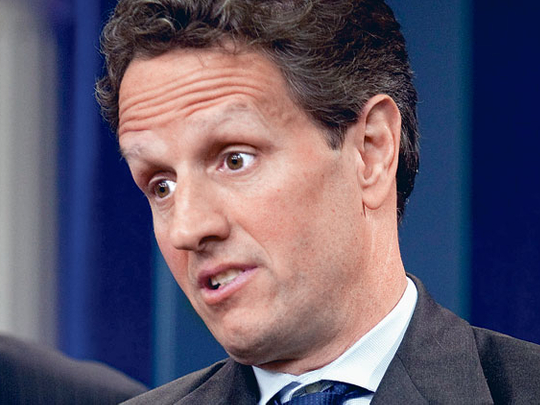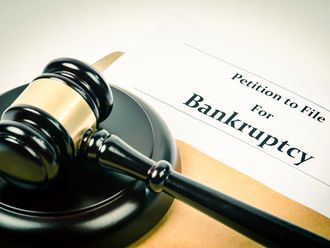
Shanghai: US Treasury Secretary Timothy Geithner said a strengthened global economy is now in better shape to handle the strains emanating from Europe's crisis, China's Xinhua news agency reported Saturday.
"You see some of the challenges in Europe now. But I think we are in a much stronger position to manage those challenges," he told Xinhua in an interview in Washington before heading to Beijing for high-level economic discussions.
Geithner also said the dollar was on the rise because confidence was growing about the strength of the US recovery.
The US Treasury chief is due to arrive in Beijing Sunday for meetings of the Strategic and Economic Dialogue, co-chairing the US side with secretary of state Hillary Clinton.
The economic component of the talks Monday and Tuesday are expected to explore ways to better balance the two countries' $400-billion (Dh1.46 trillion) trade ties, steering clear of an open clash about the yuan's peg to the dollar.
The United States still has the world's largest economy and China has the fastest-growing one, so Geithner said cooperation between the two was vital for healthy global growth.
"China and the United States are doing what we need to do to help contribute to a broader global economic recovery," he said.
The US administration is going to tackle the deficit situation very seriously, Geithner told Xinhua. As he tries to reinvigorate the US economy, President Barack Obama has set a goal of doubling exports in five years, which can be met only with a big increase in sales to China.
Geithner said both the US and Chinese economies have undergone a major transformation in recent years and struck a theme that he is expected to pursue by praising rising levels of domestic consumption in China.
The Obama administration has been urging China to rely less on exports, and more on increased consumer spending at home, to fuel its economic growth. Geithner also noted that the US economy's expansion now was being led by investment and exports, rather than consumer spending, and that savings were rising.
Europe's debt crisis has become an issue of concern, partly for fear that it might spread to other regions but also because it means a diminished market for exports from countries like China.
That has led to speculation that Beijing will be less likely to let its yuan currency rise in value, as the Obama administration was urging, since the euro's decline has made Chinese products more expensive in its top export market.
A $1 trillion safety net, provided by EU nations and the International Monetary Fund to stabilise the euro zone — following a rescue of debt-ridden Greece — has not stopped the bloc's currency tumbling.
Geithner added last-minute stops in Britain and Germany to his itinerary to discuss conditions with his counterparts in London and Berlin and with European Central Bank president Jean-Claude Trichet in Frankfurt.











